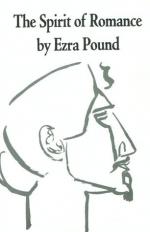|
This section contains 9,699 words (approx. 33 pages at 300 words per page) |

|
SOURCE: Sicari, Stephen. “Reading Pound's Politics: Ulysses as Fascist Hero.” Paideuma 17, no. 2-3 (fall-winter 1988): 145-68.
In the following essay, Sicari argues that Pound's explanation of heroic action in his pre-war Cantos helped formulate his later professed admiration for Fascism.
To understand Ezra Pound's admiration for Italian Fascism in general and Mussolini in particular, we can examine the poet's conception of heroic action in those of The Cantos written before the fall of the Fascist State.1 In 1938 Pound described “the Malatesta cantos” as “openly volitionist, establishing, I think clearly, the effect of the factive personality” (Guide to Kulchur 194). Sigismundo Malatesta is a hero for this poet because he manages to create something beautiful and good despite the obstacles inherent in a corrupt culture: “All that a single man could, Malatesta manages against the current of power” (GK 159). I shall argue that the poet's early work on The Cantos prepares...
|
This section contains 9,699 words (approx. 33 pages at 300 words per page) |

|


